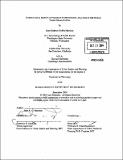International dispute settlement system design : analysis of the World Trade Organization
Author(s)
Martinez, Janet Kathryn Griffin, 1951-
DownloadFull printable version (15.48Mb)
Other Contributors
Massachusetts Institute of Technology. Dept. of Urban Studies and Planning.
Advisor
Lawrence E. Susskind.
Terms of use
Metadata
Show full item recordAbstract
The dispute settlement process established by the World Trade Organization (WTO) in 1994, (the "DSU"), has drawn widespread attention. While the DSU is the most used international dispute settlement process, it is geared to resolving complaints by one country against another concerning enforcement of the WTO rules and obligations. This research has examined the WTO in two dimensions: first, how does the DSU fit within a larger system of processes for resolving policy making and implementation, as well as enforcement disputes. Secondly, how do those processes measure up to the characteristics of effective dispute resolution. In answer to the first question, I have categorized policy disputes into three orders: first-order disputes in policymaking, second-order disputes in policy implementation, and third-order disputes in policy enforcement. The same issues, e.g., agricultural subsidies or intellectual property, emerge in all three dispute orders. First-order disputes are resolved by all WTO members through consensus-based negotiation. The negotiation experience of the last four multilateral trade negotiations--the Kennedy Round, the Tokyo Round, the Uruguay Round and the pending Doha Round--are assessed. Second-order disputes are considered by all WTO members through operating committees and the Trade Policy Review Mechanism. Third-order disputes are resolved through the DSU; 304 cases were submitted from January 1, 1995 to December 31, 2003. More effective dispute resolution processes tend to exhibit a number of characteristics: they involve lower transactions costs in terms of economics, time, bureaucracy, diplomacy and opportunity; parties are satisfied with the outcome and the process; relationships among the affected parties (cont.) are not damaged; and recurrence of the problem among the same and other parties is minimized. This research suggests that the three dispute orders be considered as an integrated system of dispute settlement. In doing so, the WTO--and other international institutions--can achieve more effective resolution of policy problems by taking advantage of the relative strengths available through each dispute order settlement process.
Description
Thesis (Ph. D.)--Massachusetts Institute of Technology, Dept. of Urban Studies and Planning, 2004. Includes bibliographical references (p. 237-241).
Date issued
2004Department
Massachusetts Institute of Technology. Department of Urban Studies and PlanningPublisher
Massachusetts Institute of Technology
Keywords
Urban Studies and Planning.